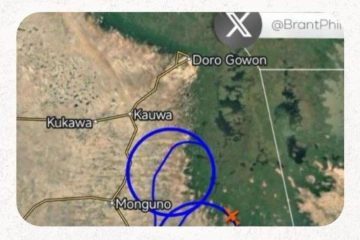
Nigeria Flag
By Dr. Michael Omoruyi, iNewsAfrica | October 1, 2025
At 65, Nigeria stands at a crossroads. The nation that was born on October 1, 1960, amid chants of freedom and hope, now finds itself wrestling with both its triumphs and tragedies. To assess Nigeria at this milestone is to confront the dual reality of a people of immense resilience and a state often shackled by mismanagement.
The Good: Strength in Culture, People, and Potential
Nigeria’s greatest asset remains its people. Across the world, Nigerians are excelling—whether it is in medicine, technology, business, or sports. From the leadership of Dr. Ngozi Okonjo-Iweala at the World Trade Organization, to the global stardom of Burna Boy, Tems, and Davido, the Nigerian flag flies proudly on international stages.
At home, Nigeria boasts of being Africa’s largest economy, with a youthful population hungry for innovation. The rise of fintech companies like Flutterwave and Paystack demonstrates a creative energy that refuses to be dimmed. Nollywood continues to export African stories, while Nigerian literature—from Achebe to Adichie—remains a powerful cultural export.
Even in politics, despite the flaws, Nigeria has sustained 25 years of uninterrupted democracy since 1999. For a nation once dominated by military coups, that stability matters.
The Bad: Failures that Haunt the Nation
Yet the celebration cannot be unqualified. At 65, Nigeria is still battling demons it should have defeated decades ago. Corruption corrodes governance, leaving infrastructure in decay and citizens disillusioned.
Security is a national emergency. Boko Haram in the northeast, banditry and kidnappings in the northwest, and militancy in the Niger Delta create a climate of fear. Ordinary Nigerians live in insecurity, unsure whether government can protect them.
The economic paradox remains glaring. A country rich in oil imports fuel, while millions languish in poverty. Inflation and unemployment choke the young and able-bodied, fueling the “Japa” wave—the exodus of Nigeria’s best talents abroad.
Ethnic and religious divides remain sharp, weaponized by politics, preventing true national cohesion. Instead of building a united Nigeria, leaders have often deepened divisions for political survival.
Nigeria’s Crossroads: Giant or Perpetual Paradox?
Nigeria at 65 is not just a commemoration of independence—it is a mirror reflecting both promise and peril. The nation could be the true giant of Africa, leading the continent into an era of prosperity. Yet, it risks remaining a giant with clay feet if leadership continues to lag behind the brilliance of its people.
The path forward demands accountability, visionary governance, and a renewed social contract between leaders and citizens. Nigerians in the diaspora, with their skills and resources, must be engaged in rebuilding the nation. And most importantly, the youth—the lifeblood of the country—must be empowered, not stifled.
Final Word
Nigeria at 65 is not a failure. Neither is it a complete success. It is an unfinished project. Its people shine everywhere they go, proving what is possible. What remains is for the nation itself to live up to the greatness within its borders.
The question is clear: Will Nigeria rise to its destiny—or remain a paradox?
About the Author
Dr. Michael Omoruyi is a technologist, educator, and author. Founder of iNewsAfrica and author of From Grit to Grace, he writes on Africa, the diaspora, and digital transformation.

From Grit to Grace: A Memoir of Roots, Resilience and Reinvention
NAF Confirms Alpha Jet Crash in Niger State, Pilots Eject Safely
December 6, 2025
Leave a reply Cancel reply
Popular Categories
- Colombia 1
- Nepal 1
- Culture 1
- Trade 1
- Ivory Coast 1
- ICJ 1
- Somali 1
- Europe 1
- United Nations 1
- Israel 1
- Travel 1
- Thailand 1
- Brazil 1
- Finland 1
- West Africa 1
- Automobile 1
- Mauritania 1
- Entertainment 1
- Mozambique 1
- Morocco 1
- Zimbabwe 1
- Myanmar 1
- Space 1
- The Hague 1
- Tunisia 1
- Vatican City 1
- Book & Arts Spotlight 1
- UNDP 1
- ECCAS 1
- Vietnam 1
- senegal 1
- Terrorism 1
- Global Diplomacy 1
- Wildlife 1
- Weather 1
- Celebration 1
- Interview 1
- BRICS 1
- Gambia 1
- Defense 1
- Gabon 1
- Pakistan 1
- Togo 1
- Democracy 2
- World Bank 2
- Algeria 2
- Rome 2
- Energy 2
- New York City 2
- Science 2
- Zambia 2
- Church 2
- Angola 2
- Economy 2
- Somalia 2
- Guinea 2
- Middle East 2
- Benin Republic 2
- Cameroon 2
- London 2
- Education 2
- Sierra Leone 2
- Business 2
- Chad 2
- Caribbean 2
- Ukraine 2
- Haiti 2
- Ukraine 2
- India 3
- Russia 3
- Uganda 3
- South Sudan 3
- Crime 3
- Namibia 3
- Music 3
- Ethiopia 3
- Transportation 3
- Rwanda 3
- Guinea-Bissau 3
- Lesotho 3
- France 3
- Aviation 3
- Congo 3
- Liberia 4
- Tanzania 4
- Health 4
- ECOWAS 5
- Libya 5
- Egypt 5
- UN 5
- UK 6
- Mali 7
- China 7
- Niger 8
- Editorial 8
- Sudan 9
- Burkina Faso 10
- Politics 11
- Tech 12
- Technology and Business 13
- Ghana 13
- World 15
- DR Congo 15
- Kenya 17
- Sports 17
- Opinion 18
- People 23
- South Africa 29
- US 47
- OP-ED 64
- Africa 87
- Nigeria 160

Email: [email protected]
Must Read
-
Kenya sends 217 more police to Haiti to help fight armed gangs
January 19, 2025 -
Nigeria at the Crossroads: How Tribalism Stifles Unity and Development
September 16, 2025 -
Mali to investigate claims soldiers ‘executed’ women and children
February 24, 2025









